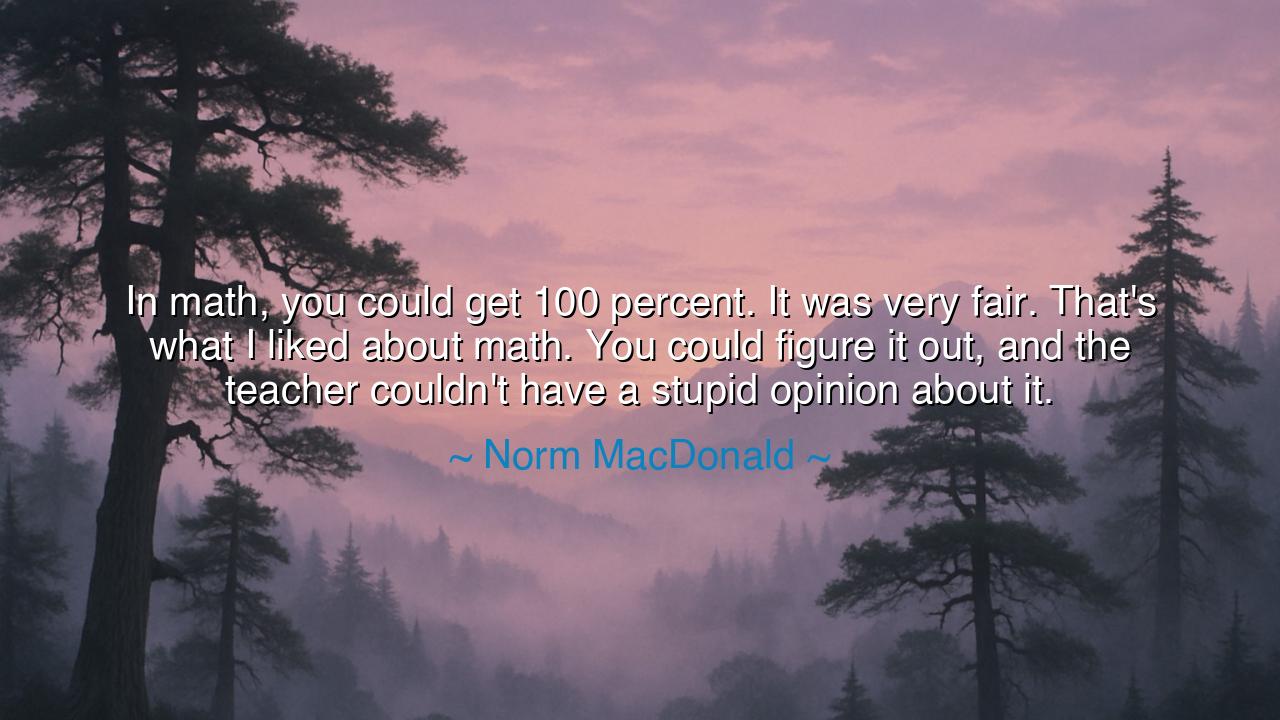
In math, you could get 100 percent. It was very fair. That's
In math, you could get 100 percent. It was very fair. That's what I liked about math. You could figure it out, and the teacher couldn't have a stupid opinion about it.






Norm MacDonald, with his sharp wit and hidden depths of reflection, once said: “In math, you could get 100 percent. It was very fair. That’s what I liked about math. You could figure it out, and the teacher couldn’t have a stupid opinion about it.” In these words, behind the humor, lies a profound meditation on truth, certainty, and the hunger of the human spirit for justice that does not bend to bias. For math is the language of the eternal, a realm where the answer is either right or wrong, untouched by favoritism, prejudice, or whim. In a world often clouded by opinion, math stands as a sanctuary of clarity.
The origin of this insight rests in MacDonald’s youth. Like many who found solace in the exactness of numbers, he discovered in math a refuge from arbitrariness. Teachers of literature or art might grade with bias, clouded by taste or mood, but in math, two plus two always equaled four, no matter who asked the question. This fairness was liberating. It meant that effort, logic, and persistence bore fruit that could not be denied by authority or bent by opinion. In a life filled with uncertainties, math became a symbol of unshakable truth.
The ancients knew this well. Pythagoras proclaimed that numbers governed the universe, and Plato declared that the study of mathematics was essential for the philosopher-king, for it led the soul beyond the realm of appearances into the realm of eternal forms. To them, math was not only fair but divine, a reflection of the order that underlies all things. No ruler’s decree could change the ratio of a circle, no teacher’s disdain could alter the square root of nine. In math, truth is sovereign, and in truth, freedom is found.
History also offers luminous examples. Consider Abraham Lincoln, who as a boy with little formal schooling, taught himself Euclidean geometry by firelight. He later said that learning the logical clarity of math shaped the way he built arguments in court and in politics. To him, as to MacDonald, the fairness of mathematics offered a discipline of the mind: if you could prove it step by step, no opinion could overrule it. In Lincoln’s hands, this clarity became a weapon of justice, enabling him to cut through falsehoods with the sharpness of reason.
The meaning of MacDonald’s words, though delivered in jest, thus rises to something heroic. He points out what every seeker of truth feels: that in many realms of life, judgment is clouded by the opinions of others—teachers, leaders, peers—who may be wrong, foolish, or unjust. But there are domains, like math, where truth shines untarnished. To find such a realm is to glimpse justice itself: impartial, incorruptible, radiant. It is no wonder that MacDonald cherished this certainty, for beneath his humor was a soul that longed for truth.
The lesson for us is clear: cherish what is fair, what is beyond opinion, what cannot be twisted by bias. Seek the clarity of reason, the discipline of logic, the unshakable ground of truth. And when you face the chaos of a world filled with noise and opinion, remember the lesson of math: that there are answers that endure, that truth does not bow to authority, that fairness exists if we labor to find it.
Practically, this means training ourselves in reason, learning to think clearly, to prove, to test, to verify. It means not surrendering our convictions to the mere weight of another’s opinion, even if that opinion is clothed in authority. It means teaching our children, not only to calculate numbers, but to honor truth above all else, so that they may live as free souls, guided not by fear of bias but by love of fairness.
Thus, Norm MacDonald’s seemingly simple words endure as wisdom: “In math, you could get 100 percent… the teacher couldn’t have a stupid opinion about it.” Let us hear the deeper call: to seek what is just, to cling to what is fair, to honor the realms of truth that opinion cannot touch. For in that pursuit lies not only knowledge, but the dignity of the soul.






AAdministratorAdministrator
Welcome, honored guests. Please leave a comment, we will respond soon